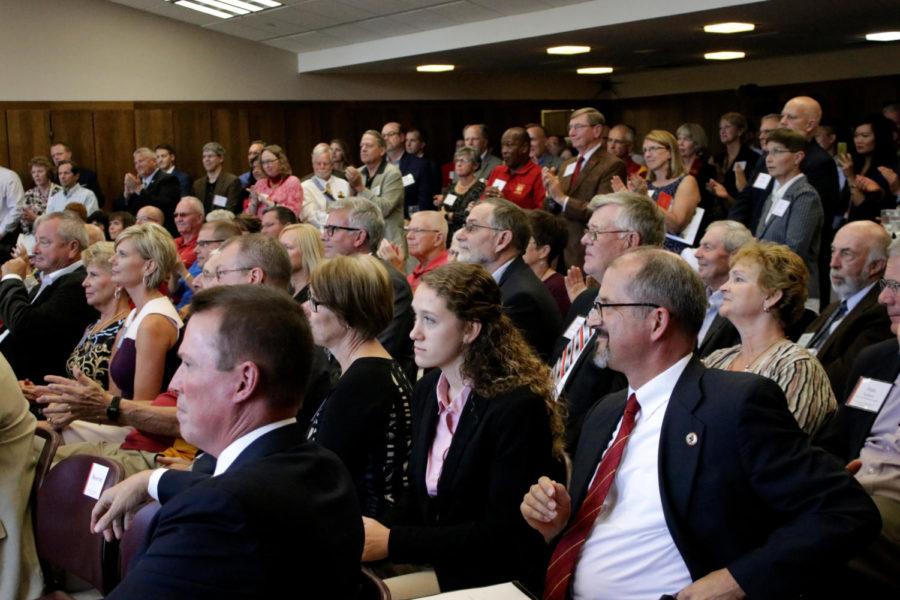The future of CALS: Looking forward to the new feed mill and grain facility
Gillian Holte/Iowa State Daily
Interim Iowa State President Ben Allen announced on Sep. 8 a $14 million donation for the Iowa State Feed Mill and Grain Science Project. The donation comes from the Kent Corporation, Iowa Corn Promotion Board, and Sukup Manufacturing Co..
September 22, 2017
A total of $14 million was recently donated toward a new feed mill and grain facility for the College of Agriculture and Life Sciences.
The Kent corporation is donating $8 million, the Iowa Corn Promotion Board $4 million and Sukup Manufacturing $2 million. For the Kent Corporation and the Iowa Corn Promotion Board, these donations are the biggest they have ever done at their company.
All three organizations are agriculture-based entities.
With these donations, over half of the estimated $21.2 million needed to produce this facility is accounted for. Looking ahead, the college is hopeful their financial goal will be reached within the near future.
“We are all optimistic that over the next few months we can complete the fundraising,” said Dirk Maier, professor of agricultural and biosystems engineering.
After the fundraising is complete, the next stage is to proceed with more detailed plans. There is a possibility that construction could start within the next year.
“Perhaps by a year from now there could be a groundbreaking. But it will still take 15-18 months to build so we could potentially be in operation in 2020,” Maier said. “2020 is the most realistic time frame at this point in time.”
Facilities for the mill will be located on State Avenue, south of U.S. Route 30, near Curtiss Farm.
The feed and grain mill has a multitude of purposes for the College of Agriculture and Life Sciences and beyond. The initial central function it will serve is in regards to academic training and education.
A key aspect of this facility is the hands-on experience that it will bring to students. It will allow students to take what they learn in the classroom and immediately put it to use.
“In this area of particular grain processing and feed manufacturing, we have not had facilities that students can study in, learn in, gain hands on experience,” Maier said.
Classes and labs will be taught directly in the facility as well.
Secondly, the mill will have space for faculty and students to do research right on campus.
However, not only Iowa State faculty and students will be using the mill for research. Outside companies will be able to come in and use the space for their own research and training purposes.
Lastly, it will continue education of international outreach and industry. A lot of crops such as grain, corn and soybeans are exported outside of the United States. In order to connect and maintain those markets, international companies will be able to come and visit the facility.
“Growing those international markets involves bringing trade teams over from different countries,” Maier said. “Now in addition to the things we are already able to showcase at Iowa State, we are able to showcase the feed manufacturing capabilities as well as provide training for them.”
Samuel Cook, researcher of feed processing and graduate in agricultural and biosystems engineering, said having the mill on campus will let Iowa State provide the feed for all of the university animals, research animals and the research farms.
This addition also allows the college to expand academically. A new minor in feed technology has been in progress since the start of this school year.
Feed processing and technology is the first course for this minor that has been underway this fall. In the spring the second course, feed quality and safety, will be taught. Currently, there are around 15 students in these classes.
This minor is targeted toward students in animal science, agricultural business, agricultural biosystems systems technology and agricultural engineering. But it is also open to anyone who has an interest in the feed and grain industry.
With the progress of the feed mill and the addition of the new feed technology minor, the college is looking to give students as much real world experience as possible so they are prepared to head out into the workforce.
There is a real hunt for talent in the feed technology industry. Cook said that a lot of the old talent is aging out and retiring but not a lot of young workers are coming in.
“The jobs are there, the industry is really screaming for people,” Cook said. “They need people to do all sorts of stuff in relation to animal feed production.”
Students can experience a lot of jobs other than just mixing feed inside the facility. Leadership, management, technology assistance and supervising are all aspects of feed technology that will be exposed to students when the feed mill opens.
Once the project is completed, Cook said he hopes to see Iowa State as the leading institution for grain and feed related education, training and research.
















